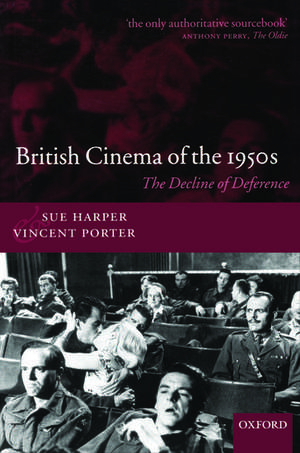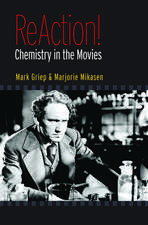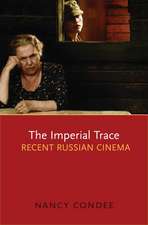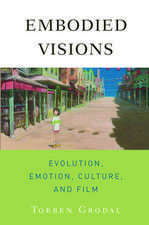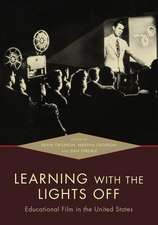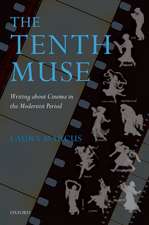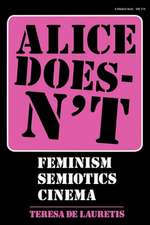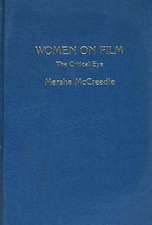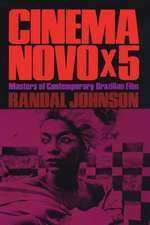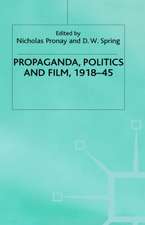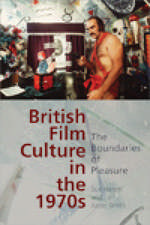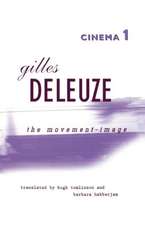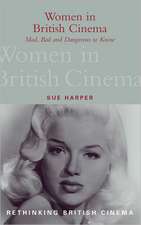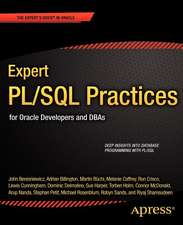British Cinema of the 1950s: The Decline of Deference
Autor Sue Harper, Vincent Porteren Limba Engleză Paperback – 25 oct 2007
| Toate formatele și edițiile | Preț | Express |
|---|---|---|
| Paperback (1) | 532.30 lei 31-37 zile | |
| OUP OXFORD – 25 oct 2007 | 532.30 lei 31-37 zile | |
| Hardback (1) | 1245.76 lei 31-37 zile | |
| OUP OXFORD – 11 sep 2003 | 1245.76 lei 31-37 zile |
Preț: 532.30 lei
Preț vechi: 676.29 lei
-21% Nou
Puncte Express: 798
Preț estimativ în valută:
101.86€ • 106.61$ • 84.78£
101.86€ • 106.61$ • 84.78£
Carte tipărită la comandă
Livrare economică 19-25 martie
Preluare comenzi: 021 569.72.76
Specificații
ISBN-13: 9780198159353
ISBN-10: 0198159358
Pagini: 420
Ilustrații: numerous halftones and tables
Dimensiuni: 155 x 228 x 22 mm
Greutate: 0.75 kg
Editura: OUP OXFORD
Colecția OUP Oxford
Locul publicării:Oxford, United Kingdom
ISBN-10: 0198159358
Pagini: 420
Ilustrații: numerous halftones and tables
Dimensiuni: 155 x 228 x 22 mm
Greutate: 0.75 kg
Editura: OUP OXFORD
Colecția OUP Oxford
Locul publicării:Oxford, United Kingdom
Recenzii
Review from previous edition Professors Harper and Porter give a detailed analysis of a seminal decade in our national cinema heritage. Their in-depth research will enhance the knowledge of any reader of this book. They include valuable insights into the film industry of that era, from the reality behind production financing to contemporary audience reactions.
[Harper and Porter's] study is especially strong in its analysis of the politicking of senior figures who aspired to provide the industry with moral guidance and leadership . . . the embroiled discussions of such matters as entertainment duty or censorship are often enlivened by well-chosen anecdotes and a deadpan humour. . . . As Harper and Porter rightly point out, British cinema of the 1950s deserves to be taken seriously. And just as Rachel Low's studies of earlier decades provide an invaluable entry point for readers, so this book is likely to become a first port of call for any student who wants to investigate the era in detail.
Where it really scores strongly is in giving credit to people who don't normally appear in histories such as script editors, minor producers: names you see on the credits but never notice. It's also good at delineating the tensions within organisations and their results. This book does for 50s cinema what Rachael Low's The History of British Film did for pre-war cinema. If you need to know about the period, this is the place to start.
[Harper and Porter's] study is especially strong in its analysis of the politicking of senior figures who aspired to provide the industry with moral guidance and leadership . . . the embroiled discussions of such matters as entertainment duty or censorship are often enlivened by well-chosen anecdotes and a deadpan humour. . . . As Harper and Porter rightly point out, British cinema of the 1950s deserves to be taken seriously. And just as Rachel Low's studies of earlier decades provide an invaluable entry point for readers, so this book is likely to become a first port of call for any student who wants to investigate the era in detail.
Where it really scores strongly is in giving credit to people who don't normally appear in histories such as script editors, minor producers: names you see on the credits but never notice. It's also good at delineating the tensions within organisations and their results. This book does for 50s cinema what Rachael Low's The History of British Film did for pre-war cinema. If you need to know about the period, this is the place to start.
